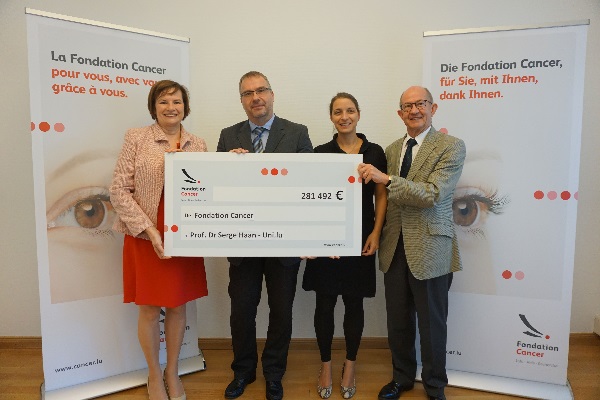 Cancer Foundation President Dr. Carlo Bock and Director Lucienne Thommes present cheque to Prof. Dr. Serge Haan;
Credit: Cancer Foundation
Cancer Foundation President Dr. Carlo Bock and Director Lucienne Thommes present cheque to Prof. Dr. Serge Haan;
Credit: Cancer Foundation
The Luxembourg Cancer Foundation recently donated €281,492 towards research on the effects of pesticides in colorectal cancer, carried out at the University of Luxembourg.
As part of the foundation's support for research, Dr. Carlo Bock and Lucienne Thommes, President and Director of the Cancer Foundation respectively, presented a cheque for €281,492 to Prof. Dr. Serge Haan, a researcher at the University of Luxembourg.
The purpose of the project "Effects of pesticides on the gut and their role in cancer development" is to investigate the effects of pesticides in colorectal cancer. Pesticides are substances used to control organisms considered to be harmful. These compounds include more than 1,000 different substances in the form of insecticides, fungicides, herbicides and parasiticides. The significant use of pesticides in different sectors of activity leads to a constant exposure of humans to these toxic substances and requires a better understanding of their impact on human health. It is already recognised that some pesticides can induce the malignant transformation of cells. In recent years, our diet as well as environmental agents are suspected to contribute to the development of cancer. It is for this reason that the chemicals present in our food could be related to the development of colorectal cancer.
As part of this research project, it is planned to first analyse the effects of exposure to various insecticides. The project will be carried out in close cooperation with Dr. Brice Appenzeller of the Luxembourg Institute of Health (LIH) who will research pesticides and their transformation products in different biological matrices (fluids, tissues, hair). This first part of the project is supported by Fondatioun Kriibskrank Kanner.
The second part of the project, supported by the Cancer Foundation, focuses on the effect of pesticides in the context of colorectal cancer. The researchers will analyse pesticide exposure in patients with colorectal cancer by determining the levels of certain pesticides in the plasma, the biopsy tissue and in the hair of these same patients. Dr Brice Appenzeller's analyses should provide information on prior exposure as well as current levels of pesticides to which patients may have been exposed. Pesticide levels identified in tumours can be further compared to those detected in hair and blood to determine the relationship between levels in different tissues, to understand the transfer of pesticides in different tissues and their accumulation over time .
In parallel, Prof. Serge Haan will focus on the molecular mechanisms and signaling cascades induced by pesticides. Researchers have established normal cell and tumour cultures that generate in vitro "small colons" and study the effect of pesticides on both healthy and cancerous epithelial cells. This will provide the opportunity to study the impact of pesticides on the genesis and progression of cancer. The goal will be to identify molecules and genes induced and modified by pesticides. Thus, researchers can try to target these molecules to prevent and/or slow the progression of cancer. They will also be interested in the influence of pesticides on the resistance of tumours to certain therapies.








